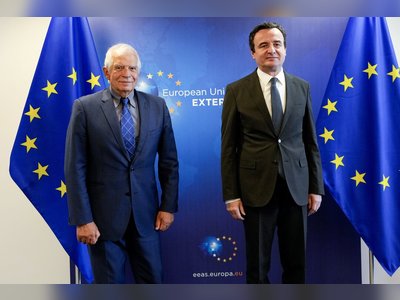
Friedrich Merz Declared Winner of German Federal Elections, Potential Future Chancellor
The head of the Christian Democratic Union (CDU) wins approximately 29% of the vote, aiming to form a government amid economic and geopolitical challenges.
Friedrich Merz, president of the Christian Democratic Union (CDU), has announced his victory in today's extraordinary elections in Germany.
The long-time political rival of former Chancellor Angela Merkel has positioned himself as the likely next chancellor following his party securing approximately 29% of the votes cast.
"I am aware of the responsibilities and the level of tasks ahead of us.
The campaign has been very challenging, dealing with issues of economic policy, migration, foreign and security policy.
I am confident that I will soon be able to form a government capable of acting in the interest of Germany.
The outside world is not waiting for us and prolonged negotiations," Merz stated as he proclaimed his victory.
Merz is expected to seek one or two coalition partners to establish a governing majority.
In the German parliamentary system, coalition negotiations can last several months.
"The outside world does not wait for us, nor for prolonged coalition negotiations.
We must quickly become operational again to do what is necessary domestically, to be present again in Europe," he remarked following the release of initial exit poll results.
At 69 years of age, Merz could become the oldest chancellor in German history, surpassing Konrad Adenauer, the first post-war chancellor.
Predictions and preliminary results suggest he is well-positioned to be elected.
Germany is facing a multitude of challenges, including a stagnating economy, the need for infrastructure and industrial investment, and increasing geopolitical threats, such as the war in Ukraine and threats from Russia.
Merz has pledged to implement policies that will "push Germany forward" and restore citizens' pride in their country.
Known for his corporate ties and wealth acquired in the private sector, Merz has a reputation as a pragmatic politician, though he has been criticized for perceived arrogance.
The CDU, along with its Bavarian sister party, the Christian Social Union (CSU), has secured a strong position and the highest number of seats in the Bundestag.
Merz’s leadership of the party has marked a shift to the right, particularly concerning migration and security issues, as well as economic policy.
Born into a Catholic and conservative family, he has been a CDU member since 1972.
He studied law, worked briefly as a judge, and then as a lawyer and corporate attorney, gaining extensive business contacts.
Merz began his political career in 1989, serving as a member of the European Parliament, and was later elected to the Bundestag, serving until 2009. His political career complicated by a conflict with Angela Merkel, who succeeded him as CDU leader, led to his departure from the political arena.
After stepping away from politics, he established a successful career in the private sector as a partner in the law firm Mayer Brown and later as the head of the German branch of BlackRock, an American investment firm.
This transition to the private sector, along with his substantial wealth, has become a sensitive topic during his political comeback attempts, with critics pointing to his lavish lifestyle, which includes the ownership of two private jets.
Merz was re-elected to the Bundestag in 2021 and subsequently assumed the leadership of the CDU.
His political agenda clearly aims to reverse the liberal changes enacted by Merkel and to shift the party back toward the right, particularly regarding migration.
He describes his political view as socially conservative and economically liberal, advocating for less state intervention and greater investment in economic development.
He has sharply opposed Merkel's open-door policy for refugees, characterizing his migration policy as focused on security, law, and order.
However, his views on migrants, particularly Muslim immigrants, have sparked controversy.
Merz has previously referred to the children of Muslim immigrants as "little bastards" lacking respect for authority, and has suggested that migrants can access expensive dental services while ordinary German citizens cannot receive adequate healthcare.
He criticized the increased influx of Ukrainian refugees, labeling it as "social tourism" intended simply to exploit German services, though he later apologized.
While critics have accused Merz of populist rhetoric, supporters regard him as a politician unencumbered by political correctness, willing to speak his mind without fear of losing support.
This forthrightness on key issues has also allowed him to cultivate a solid political image among right-wing voters.
Although he is known for his liberal stance on economic issues, his position on international relations reveals concerns for the stability of transatlantic ties.
Merz has long advocated for the German-American partnership, viewing it as crucial for security and economic recovery.
At the same time, he has criticized the current German government for its uncertain foreign policy and lack of clear steps to enhance European defense.
He has also voiced criticism of Donald Trump's trade policy towards the EU and Germany during his first term, raising interest in how he might navigate relations with Trump and the Biden administration, which has shown support for the far-right Alternative for Germany (AfD).
Merz strongly supports Ukraine in its conflict with Russia, advocating for a more robust approach to providing military aid.
He has delivered rhetorical backing to President Zelensky and described Berlin’s policy as compelling Ukraine to fight Russia with one hand tied behind its back.
Merz maintains a staunch pro-Israel stance, advocating for sending arms to the Israeli government and dismissing criticisms of Prime Minister Netanyahu's policies in the conflict with Hamas in Gaza.
Amid current economic and political uncertainties, his electoral success could indicate a new phase for German politics, potentially marked by a more market-oriented social and economic policy with reduced government intervention.
Questions remain about the extent to which such a direction would enhance Germany's economy and international standing in Berlin.
Merz's path to the chancellorship may also encounter resistance, both within the CDU and among other political parties and voters opposed to his views on migration and other issues.
His personal approval ratings are not at a particularly high level, as some prominent CDU members enjoy significantly better standings among German voters.
The challenge of forming a new ruling majority also looms large.
The CDU will not have enough votes to govern alone and will need to enter into a coalition.
Merz has already dismissed the possibility of coalition with the far-right AfD, which has firmly positioned itself as the second political force in Germany.
The far-right Alternative for Germany (AfD) nominated Alice Weidel as its candidate for chancellor in these parliamentary elections.
This marks the first time the AfD has put forward its own candidate for chancellor.
Nonetheless, the likelihood of her attaining the position appears slim as other parties have refused to collaborate with the far-right.
The long-time political rival of former Chancellor Angela Merkel has positioned himself as the likely next chancellor following his party securing approximately 29% of the votes cast.
"I am aware of the responsibilities and the level of tasks ahead of us.
The campaign has been very challenging, dealing with issues of economic policy, migration, foreign and security policy.
I am confident that I will soon be able to form a government capable of acting in the interest of Germany.
The outside world is not waiting for us and prolonged negotiations," Merz stated as he proclaimed his victory.
Merz is expected to seek one or two coalition partners to establish a governing majority.
In the German parliamentary system, coalition negotiations can last several months.
"The outside world does not wait for us, nor for prolonged coalition negotiations.
We must quickly become operational again to do what is necessary domestically, to be present again in Europe," he remarked following the release of initial exit poll results.
At 69 years of age, Merz could become the oldest chancellor in German history, surpassing Konrad Adenauer, the first post-war chancellor.
Predictions and preliminary results suggest he is well-positioned to be elected.
Germany is facing a multitude of challenges, including a stagnating economy, the need for infrastructure and industrial investment, and increasing geopolitical threats, such as the war in Ukraine and threats from Russia.
Merz has pledged to implement policies that will "push Germany forward" and restore citizens' pride in their country.
Known for his corporate ties and wealth acquired in the private sector, Merz has a reputation as a pragmatic politician, though he has been criticized for perceived arrogance.
The CDU, along with its Bavarian sister party, the Christian Social Union (CSU), has secured a strong position and the highest number of seats in the Bundestag.
Merz’s leadership of the party has marked a shift to the right, particularly concerning migration and security issues, as well as economic policy.
Born into a Catholic and conservative family, he has been a CDU member since 1972.
He studied law, worked briefly as a judge, and then as a lawyer and corporate attorney, gaining extensive business contacts.
Merz began his political career in 1989, serving as a member of the European Parliament, and was later elected to the Bundestag, serving until 2009. His political career complicated by a conflict with Angela Merkel, who succeeded him as CDU leader, led to his departure from the political arena.
After stepping away from politics, he established a successful career in the private sector as a partner in the law firm Mayer Brown and later as the head of the German branch of BlackRock, an American investment firm.
This transition to the private sector, along with his substantial wealth, has become a sensitive topic during his political comeback attempts, with critics pointing to his lavish lifestyle, which includes the ownership of two private jets.
Merz was re-elected to the Bundestag in 2021 and subsequently assumed the leadership of the CDU.
His political agenda clearly aims to reverse the liberal changes enacted by Merkel and to shift the party back toward the right, particularly regarding migration.
He describes his political view as socially conservative and economically liberal, advocating for less state intervention and greater investment in economic development.
He has sharply opposed Merkel's open-door policy for refugees, characterizing his migration policy as focused on security, law, and order.
However, his views on migrants, particularly Muslim immigrants, have sparked controversy.
Merz has previously referred to the children of Muslim immigrants as "little bastards" lacking respect for authority, and has suggested that migrants can access expensive dental services while ordinary German citizens cannot receive adequate healthcare.
He criticized the increased influx of Ukrainian refugees, labeling it as "social tourism" intended simply to exploit German services, though he later apologized.
While critics have accused Merz of populist rhetoric, supporters regard him as a politician unencumbered by political correctness, willing to speak his mind without fear of losing support.
This forthrightness on key issues has also allowed him to cultivate a solid political image among right-wing voters.
Although he is known for his liberal stance on economic issues, his position on international relations reveals concerns for the stability of transatlantic ties.
Merz has long advocated for the German-American partnership, viewing it as crucial for security and economic recovery.
At the same time, he has criticized the current German government for its uncertain foreign policy and lack of clear steps to enhance European defense.
He has also voiced criticism of Donald Trump's trade policy towards the EU and Germany during his first term, raising interest in how he might navigate relations with Trump and the Biden administration, which has shown support for the far-right Alternative for Germany (AfD).
Merz strongly supports Ukraine in its conflict with Russia, advocating for a more robust approach to providing military aid.
He has delivered rhetorical backing to President Zelensky and described Berlin’s policy as compelling Ukraine to fight Russia with one hand tied behind its back.
Merz maintains a staunch pro-Israel stance, advocating for sending arms to the Israeli government and dismissing criticisms of Prime Minister Netanyahu's policies in the conflict with Hamas in Gaza.
Amid current economic and political uncertainties, his electoral success could indicate a new phase for German politics, potentially marked by a more market-oriented social and economic policy with reduced government intervention.
Questions remain about the extent to which such a direction would enhance Germany's economy and international standing in Berlin.
Merz's path to the chancellorship may also encounter resistance, both within the CDU and among other political parties and voters opposed to his views on migration and other issues.
His personal approval ratings are not at a particularly high level, as some prominent CDU members enjoy significantly better standings among German voters.
The challenge of forming a new ruling majority also looms large.
The CDU will not have enough votes to govern alone and will need to enter into a coalition.
Merz has already dismissed the possibility of coalition with the far-right AfD, which has firmly positioned itself as the second political force in Germany.
The far-right Alternative for Germany (AfD) nominated Alice Weidel as its candidate for chancellor in these parliamentary elections.
This marks the first time the AfD has put forward its own candidate for chancellor.
Nonetheless, the likelihood of her attaining the position appears slim as other parties have refused to collaborate with the far-right.
AI Disclaimer: An advanced artificial intelligence (AI) system generated the content of this page on its own. This innovative technology conducts extensive research from a variety of reliable sources, performs rigorous fact-checking and verification, cleans up and balances biased or manipulated content, and presents a minimal factual summary that is just enough yet essential for you to function as an informed and educated citizen. Please keep in mind, however, that this system is an evolving technology, and as a result, the article may contain accidental inaccuracies or errors. We urge you to help us improve our site by reporting any inaccuracies you find using the "Contact Us" link at the bottom of this page. Your helpful feedback helps us improve our system and deliver more precise content. When you find an article of interest here, please look for the full and extensive coverage of this topic in traditional news sources, as they are written by professional journalists that we try to support, not replace. We appreciate your understanding and assistance.










